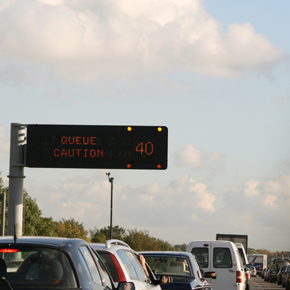
The potential dangers of increased LCV use
As LCV use is expected to double during the next five years, time spent refuelling is becoming a critical issue for operators, according to The Fuelcard People.
Steve Clarke, the company’s group marketing manager, has highlighted an overlooked challenge in the rising use of LCVs:
“Moving the same load in smaller vehicles means more traffic. That is challenging, but is only the tip of the iceberg. There will be a real effect on everyone from greater van traffic.”
Higher forecourt demand
The increased use of LCV vans has potential consequences for everyone, warns Steve.
As LCVs become an increasingly popular alternative to trucks, the frequency of refuelling is also set to increase, resulting in higher forecourt demand and queuing.
He continues: “The longer that it takes each driver to complete the process, the worse it becomes. Unless everyone gets in and out quickly, there will be queues before the pumps and bottlenecks rejoining the road.”
He also commented that long lines of vehicles trying to leave a filling station could have safety implications.
“A constant stream of vehicles trying to feed back onto the carriageway means that other drivers have to slow down or move over,” he said.
“This means congestion and, possibly, sudden braking. That is a potential hazard. If vehicles are unable to leave the exit slipway, traffic will back up right through the filling station and cause queues before it. Van users and drivers can hardly be blamed, but we can all expect problems.”
Fuelcard solution
Steve asserts that Fuelcards can offer a solution to the growing problem, as an additional 2.5 million vans are expected to hit UK roads by 2020.
The Fuelcard People provide cards which allow LCV and other commercial road users to refuel at a fixed weekly price, available at thousands of locations throughout the country.
The result is a typical discount of up to 4p per litre on pump prices, with larger savings on the motorways.
The cards can currently be used at BP, Esso, Shell and Texaco petrol stations, on the Diesel Direct and UK Fuels networks and on supermarket forecourts.
Latest news

28th February 2025
Passivent ventilation solutions are top of the class
Passivent has supplied a combination of Hybrid Plus2 Aircool ventilators and Hybrid Plus Airstract roof ventilation terminals for a new London primary school.
Posted in Air Conditioning, Articles, Building Industry News, Building Products & Structures, Building Services, Case Studies, Ceilings, Facility Management & Building Services, Heating, Ventilation and Air Conditioning - HVAC, Restoration & Refurbishment, Retrofit & Renovation, Roofs, Sustainability & Energy Efficiency, Ventilation, Walls
28th February 2025
Troldtekt: New acoustic liner ensures good acoustics and easy handling
Both a building’s users and its developers have a good reason to get excited about the new Troldtekt Plus 25 panels. This specially developed acoustic panel sets a high standard for both sound absorption and building efficiency.
Posted in Acoustics, Noise & Vibration Control, Articles, Building Industry News, Building Products & Structures, Building Services, Building Systems, Ceilings, Facility Management & Building Services, Floors, Innovations & New Products, Insulation, Interior Design & Construction, Interiors, Restoration & Refurbishment, Retrofit & Renovation, Timber Buildings and Timber Products, Walls
28th February 2025
InstallerSHOW 2025 – Registration is now OPEN!
Building on the success of last year, InstallerSHOW is returning to the NEC from the 24th to the 26th of June…
Posted in Articles, Building Industry Events, Building Industry News, Building Products & Structures, Building Services, Exhibitions and Conferences, Health & Safety, Retrofit & Renovation, Seminars, Sustainability & Energy Efficiency
28th February 2025
ABLOY securing Helsinki’s heritage and Croatia’s waste management
ABLOY, part of ASSA ABLOY Group, has redefined its brand, focusing on the value it brings to customers around the world…
Posted in Access Control & Door Entry Systems, Architectural Ironmongery, Articles, Building Industry News, Building Products & Structures, Building Services, Case Studies, Doors, Facility Management & Building Services, Health & Safety, Retrofit & Renovation, Security and Fire Protection
 Sign up:
Sign up: